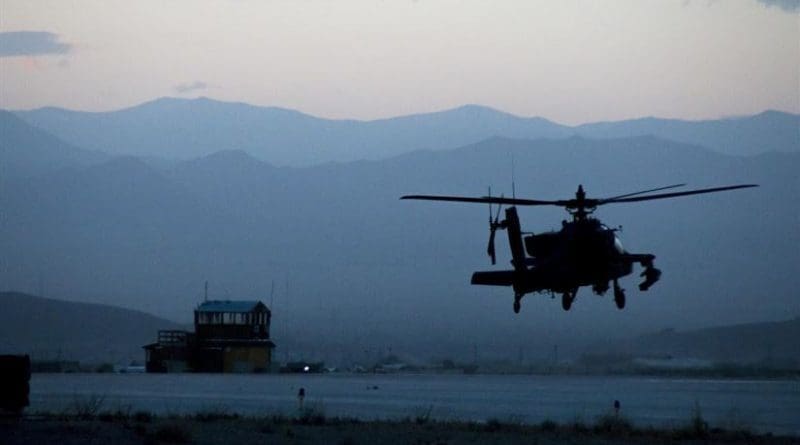Afghanistan: A Civil War Or An International Threat – OpEd
After a twenty-year journey and efforts, the United States failed to convince and/or pressuring Pakistan to act honestly, and finally America directly signed a bilateral agreement with Taliban in February 2020 which of course lakes all the legitimacy since a super power enters into an agreement with a fraction that had been blacklisted by the UN Security Council based on the intelligence reports provided by the U.S. agencies, and again taken the sanctions out temporary by the U.S. communication.
The United States is withdrawing from a soil that they went to a devastating state of relationships with Karzai administration in 2014 to get him sign the BSA which should have made the U.S. troops staying in Afghanistan. Yet the BSA, SOFA, RSM and 2017 U.S. strategy for Afghanistan and South Asia are in place but breached.
Recently many states including the U.S.A, Russia, China, Pakistan and Europeans have shown their concerns and predicted a civil war in Afghanistan. On June 17, at a Senate Appropriations Committee hearing, Sen. Lindsey Graham, R-S.G., asked Defense Secretary Llyod Austin and Gen. Mark Milley whether they rated the likelihood of a regeneration of al-Qaida or the IS group in Afghanistan as small, medium or large.
“I would assess it as medium,” Asutin replied. “I would also say, senator, that it would take possibly two years for them to develop that capability.”
Milley, the chairman of the Joint Chiefs of Staff and a veteran of the war in Afghanistan, said he agreed.
“I think that if certain other things happen – if there was a collapse of the government or the dissolution of the Afghan security forces – that risk obviously increase, but right now I would say ‘medium’ and about two years or so,” Milley said.
Unfortunately, in the presence of the U.S. and NATO, Afghanistan has been the victim of conspiracy theories and policies for the last two decades. As yet, the regional and international powers anticipate a Civil War, while they should have learned a lesson from the past four decades of Afghanistan especially since 2001, and based on these lessons and findings the future of Afghanistan shall be assessed.
If Afghanistan is really left all alone as President Biden said on July 25 “Afghans are going to have to decide their future,” and of course if it is left the way it was after the cyclone project then it won’t be a civil war only but an international terrorism. Today’s circumstances are a 180ᴼ different than those in 90s. In 90s the U.S. won the cold war and Pakistani trained Jihadi groups started fighting over the power right after reaching Kabul, but there were no international terrorist groups like al-Qaeda and IS, no country had the chance to promote proxy war, security dilemma and/or a two-level game, but last two decades has provided an unlimited ground to everyone for their proxy wars in Afghanistan. In 90s countries like Russia, China and India did not have the chance to use the Afghan soil against their enemy states but they have got it in the last two decades. Consequently, if Afghanistan goes to a civil war that must be considered as an international absolute threat, a civil war will provide everyone a ground to threaten others’ interests. Pakistan needs to cooperate and shall take all the possible steps with full degree of honesty or they will face regrettable circumstances since India has already made themselves a ground in Afghanistan and in case of a civil war, they can give enough headaches to Pakistan. Similarly, other regional powers will easily utilize groups like al-Qaida, IS, TIM and ETIM from a ground provided by chaotic civil war, which might make the world to forget 9/11.
The more shocking was when on July 02, President Biden cut off questions on Afghanistan just because it was a holiday weekend and he wanted to talk about “happy things,” “This is a holiday weekend. I’m going to celebrate it, I want to talk about happy things, man.” That means, a few hours of chilling worth the risk of billions of people in the world in particular the 40 million innocent Afghans, it was barely an articulation to win over Western soldiers who were fighting the Taliban for two decades. How could a leader who has had an almost 50 year of political experience gives such statement?
In conclusion, what the world in particular the U.S. calls a civil war will not be a civil war but an international terrorism. With that in mind, there is still a great chance to secure the world and protect the lives of billions of people by considering the threat as to the entire world rather than an Afghan issue only and/or shall be decided by the Afghans, or rather the history will hold today’s decision maker accountable.
*Najibullah Azad is a politician, lawyer, advocate, consultant, researcher and founder and leader of the Bawar Movement, a political party, in Kabul. He was once the spokesperson to President Ashraf Ghani, he can be reached at: [email protected] , https://www.facebook.com/Nj.Aazad/and @NajibullahAzad


The points analyzed in this paper are undeniable realities that the world must pay serious attention. Afghans were forgotten in the 90s where millions of lives lost and the country was destroyed, also the world experienced the rise of extremism, Talibanizaion and Al Qaida. Leaving this again as an Afghan issue will not only be repeating the same mistake and much bigger this time, in the meantime it is officially allowing the international terrorism to rise. The immediate threat will be to 40 million Afghans and opening another inhuman chapter of extremism in Afghan societies, and will most probably be followed by a potential expansion of threat to the entire Euro – Russia region.
The world can’t afford expansion of extremism and international terrorism.